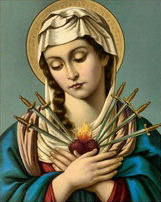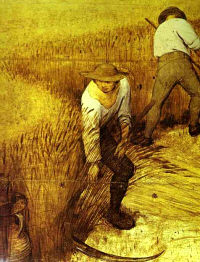 |
| Lacordaire o.p.,(mononymous), pupit orator |
Night
Office
Monastic
Lectionary
A Word in
Season, Readings for the Liturgy Hours VI..
TWENTY-SECOND WEEK IN ORDINARY TIME
SUNDAY
First Reading
2
Kings 14:1-27
Responsonory; Mt 24:7.11-13; Eph 6:11
Nation will go to war against nation, and kingdom against kingdom. Many false prophets will arise and lead many astray, and as lawlessness spreads, most people's love will grow cold. But + whoever perseveres to the end will be saved.
v. Put on the whole armour of God, so that you may be able to stand against the wiles of the devil. +Whoever perseveres ...
Second Reading From a Letter by Lacordaire
Lacordaire, Lacordaire et ls Parole de Dieu: Etudesreligeuses 759, 66-67
Lacordaire, Lacordaire et ls Parole de Dieu: Etudesreligeuses 759, 66-67
If, taught gradually by the Church and imbued with her life-giving breath,
we enter with facility of heart into that monument of truth built by God which
is the Bible, we will pass under many shadows in its depths, passages where
one has to bend one's head, and sublimities where our understanding will almost
fail.
However,
supported by our unfailing companion, the Church herself, we will go from inspiration to inspiration under the firmament of the holy
Word, rejoicing with it in the open plains of eternity, admiring Jesus Christ as he comes ever nearer, longing for him with
the patriarchs, seeing him from afar with the prophets, greeting him with the
harp of the psalms, until
at last, on the threshold of the second temple, he
appears to us wholly filled with his glory and death, predestined victim of the reconciliation of
souls,
and
sovereign explication
of all that is by all that was.
This vision of Jesus Christ not only fills the long roll of holy books; it interweaves
great world events. The Christian sees these events therein under the hand
of providence, guided
by the laws of justice and grace. In this light he discerns the succession
of empires, the rise and fall of great races. He realizes that neither chance nor
fate mean anything, but that everything progresses under the twofold impulse of the
freedom of man and the wisdom of God. This view of the true meaning of history
enraptures the Christian. He gains an understanding of life which no experience
could give him, because experience shows him only man, whereas the Bible reveals at one and the same time both God in
man and man in God.
This revelation not only makes itself felt in the great moments of the Bible; it is there throughout. God is never absent from his
work.
He
is in the field with Boaz, behind the daughter of Naomi, just as he is in Babylon at
Belshazzar's feast. He sits by Abraham's tent as a traveler wearied by his journey, just as he
dwells on the summit of
Mount Sinai in the thunder proclaiming his presence. He helps Joseph in prison, just as he crowns Daniel in captivity. The smallest details of family or wilderness, the names, places, and events, all these are filled with God, and it is in the course of four millennia, from Eden to Calvary, from righteousness lost to righteousness regained, that one follows from beginning to end, step by step, all the
movements of his mercy and all those of his might.
Who could remain unmoved by so great a pilgrimage? Guided by faith along such
paths, who could fail to return home a better man? The Bible is at one and the same time the drama of our destiny, the primitive
history of the human race,
the philosophy of saints, the legislation of
a people chosen and
governed by God; within the providence of four thousand years it is the preparation and the
seed of the whole future
of mankind;
it
is
the
storehouse
of
all the
truth
needed by man, the charter of his rights, the treasury of his hopes, the abyss of his consolations, the kiss of God upon his heart; finally, it is Christ the Son of God who
has saved him.
Responsory Rm 15:4; 2 Tm 3:16
All that was written long ago in scripture was written for our instruction,+ so that by its encouragement we might have hope.
V. All scripture is inspired by God and profitable for teaching, for refuting error, for correction, and for training in right living, +so that by its ...
Lacordaire, Henri
Dominique (1802-1861) Ordained priest in 1827, he worked
in association with Lammenais for the periodical L'Avenir, until its modernist teaching was condemned in the Encyclical Mirari vos in 1832. He broke with Lamennais, went to Rome and was clothed as a Dominican there in 1839. The restoration of Dominican life in France in 1850 was due to his efforts. Throughout his life he was impelled by the desire to bring Christianity to a new birth in his own age. He wrote much, including many letters to young
people
who sought his help. These
show his
skill and devotion as a spiritual director.



